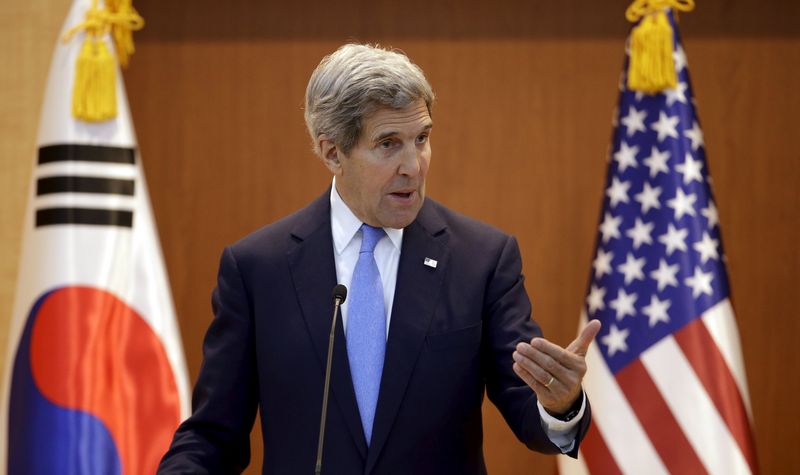- California Assembly OKs highest minimum wage in nation
- S. Korea unveils first graphic cigarette warnings
- US joins with South Korea, Japan in bid to deter North Korea
- LPGA golfer Chun In-gee finally back in action
- S. Korea won’t be top seed in final World Cup qualification round
- US men’s soccer misses 2nd straight Olympics
- US back on track in qualifying with 4-0 win over Guatemala
- High-intensity workout injuries spawn cottage industry
- CDC expands range of Zika mosquitoes into parts of Northeast
- Who knew? ‘The Walking Dead’ is helping families connect
US tells China to end ‘business as usual’ with N. Korea

U.S. Secretary of State John Kerry told reporters Thursday that he spoke by phone with Chinese Foreign Minister Wang Yi. (AP-file)
WASHINGTON (AP) — U.S. Secretary of State John Kerry on Thursday urged China to end “business as usual” with North Korea after the isolated nation conducted its fourth nuclear test.
Kerry told reporters that he spoke by phone with Chinese Foreign Minister Wang Yi. He said that China’s approach to North Korea had failed.
Kerry rejected a reporter’s suggestion that the Obama administration had neglected the North Korean threat as it focused on curbing Iran’s nuclear program. He said there had been constant consultations on North Korea, including on his first trip to China after he became the top U.S. diplomat in 2013.
“Now China had a particular approach that it wanted to make and we agreed and respected to give them the space to be able to implement that, but today in my conversation with the Chinese I made it very clear, that has not worked and we cannot continue business as usual,” Kerry said, without elaborating.
The U.N. Security Council has pledged new sanctions against North Korea after its purported hydrogen bomb test on Wednesday. China has a pivotal position as it is a permanent council member and the North’s main trading partner. Fraternal relations between Beijing and Pyongyang have become strained in recent years, but China has been reluctant to impose economic restrictions that could destabilize its wayward neighbor and cause turmoil on its border.
Kerry said he and Wang agreed to work very closely together on steps “to address our increasing concerns about that nuclear test.”
Meanwhile, pressure was mounting in Washington for congressional action to punish North Korea. The House of Representatives will vote as early as next week on legislation imposing new U.S. sanctions.
Leader of the Democratic minority, Nancy Pelosi of California, promised Thursday there will be strong bipartisan support for the legislation tabled by the top Republican and Democrat lawmakers on the House Foreign Affairs Committee that would target access to hard currency and other goods and step up inspections of North Korean cargo.
Similar legislation passed the House two years ago but did not advance in the Senate.
“The easy solution here is to go after the one place where they (North Korea) get the hard currency,” said Rep. Ed Royce, the Republican committee chair. He said that the 2005 blacklisting of Banco Delta Asia, a bank based in the Chinese territory of Macau that held North Korean government funds, had restricted then-leader Kim Jong Il’s ability to pay his generals.
“It worked for a while in the past until we lifted those sanctions under the thought that North Korea might come back to the table. Of course they cheated on that agreement, so we made the wrong move,” he told CNN, calling for a similar approach on sanctions again to restrict the North’s ability to fund its weapons programs.
Sanctioning banks in China that handle North Korean transactions could upset Beijing. U.S. officials have also said there are few targets available because of the North’s isolation from the international financial system.
____
Associated Press writer Erica Werner contributed to this report.















